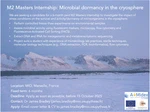Master 2 internship - Microbial dormancy in the cryosphere
Mediterranean Institute of Oceanography
Mediterranean Institute of Oceanography
Homepage: https://www.jbradleylab.com/
Cryospheric Sciences (CR)
Ocean Sciences (OS)
Master 2 internship – Academic year 2025 – 2026: Investigating Microbial Dormancy responses to stress cycles in the cryosphere
Supervisors: James A. BRADLEY (james.bradley@mio.osupytheas.fr) and Rey MOUROT (rey.mourot@mio.osupytheas.fr)
Team: Environmental Microbiology and Bioprocesses (MEB), Mediterranean Institute of Oceanography . Aix-Marseille University.
Website: https://www.jbradleylab.com/
Expected start date : January 2026
Contract period : 6 months (with stipend/gratification).
Workplace : Mediterranean Institute of Oceanography, Campus Luminy, Marseille, France
Type of contract : Internship convention
Proportion of work : Full time
Head of the MEB team: Laurie Casalot & Benjamin Misson
ABSTRACT:
Dormancy is one of the key adaptive strategies employed by microorganisms to withstand unfavourable environmental changes [1]. Glacier ecosystems experience environmental fluctuations during periods of freezing which can extend from hours up to thousands of years, thus providing ideal natural settings to investigate dormancy in bacterial populations [2]. Given the polar regions' exceptional vulnerability to anthropogenic climate change [3], these ecosystems offer a critical perspective on how environmental alterations drive microbial state transitions, with cascading effects on ecological functions and biogeochemical cycles [4].
AIM:
The objective of the master’s project is to investigate the impact of stress conditions including freeze-thaw cycles and nutrient depletion on the survival and activity of microorganisms in the cryosphere.
The student will perform controlled freeze-thaw experiments on environmental samples to simulate natural stress conditions. Microbial activity will be assessed using a range of techniques, including RedoxSensor Green (RSG), BONCAT (Bioorthogonal Non-Canonical Amino Acid Tagging) and other viability markers, further differentiated through fluorescence microscopy, flow cytometry and Fluorescence-Activated Cell Sorting (FACS). Following cell-sorting, the student will co-extract DNA and RNA for metagenomic and metatranscriptomic sequencing, providing insights into the functional potential and gene expression changes in response to repeated stress.
The results will contribute to understanding microbial adaptation strategies in cold environments and their implications for global biogeochemical cycles under climate change. This is particularly important as more winter warming and rain events have been recorded in the arctic [5], increasing the frequency of freeze-thaw events, thus potentially affecting the dynamics of microbial communities in snow and ice.
Work context:
- You will work on a cutting-edge topic related to the glacier ecosystem and to global climate change.
- You will join a large international multidisciplinary team of microbiologists, biogeochemists, and Earth system scientists.
- You will receive a stipend in accordance with current regulations.
Eligibility Criteria:
The candidate must have validated a first year of Master studies in a relevant natural science discipline (e.g. microbiology, biology, ecology).
Required skills:
The student must have a working knowledge of microbial ecology, biogeochemistry, and/or cellular processes. The student must have basic knowledge of microbiology lab practices, including sterile techniques and basic microscopy. Experience with molecular biology techniques (e.g., DNA extraction, PCR, bioinformatics) or flow cytometry is an advantage. The candidate should be proactive and capable of working independently, as well as working harmoniously as part of a team. The working language is English and thus fluency in the English language is required.
References:
[1] Lennon, J. T. & Jones, S. E. Microbial seed banks: the ecological and evolutionary implications of dormancy. Nat. Rev. Microbiol. 9, 119–130 (2011).
[2] Anesio, A. M., Lutz, S., Chrismas, N. A. M. & Benning, L. G. The microbiome of glaciers and ice sheets. npj Biofilms Microbiomes 3, 10 (2017).
[3] Rantanen, M. et al. The Arctic has warmed nearly four times faster than the globe since 1979. Commun. Earth Environ. 3, 168 (2022).
[4] Wadham, J. L. et al. Ice sheets matter for the global carbon cycle. Nat. Commun. 10, 3567 (2019).
[5] Graham, R. M. et al. Increasing frequency and duration of Arctic winter warming events. Geophys. Res. Lett. 44, 6974–6983 (2017).
How to apply:
Send your CV and cover letter (in english) to James Bradley (james.bradley@mio.osupytheas.fr) and Rey Mourot (rey.mourot@mio.osupytheas.fr). The cover letter (maximum 2 pages) should state your motivation for applying to this position, research interests, relevant skills, training and experience. Please send your application materials as soon as possible and especially before the 15th of October.

